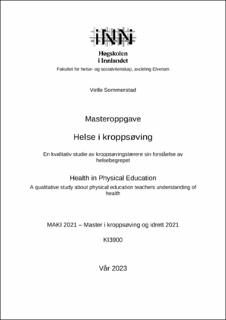| dc.contributor.advisor | | |
| dc.contributor.author | Vetle Sommerstad | |
| dc.date.accessioned | 2023-07-15T16:10:34Z | |
| dc.date.available | 2023-07-15T16:10:34Z | |
| dc.date.issued | 2023 | |
| dc.identifier | no.inn:inspera:149022672:35562103 | |
| dc.identifier.uri | https://hdl.handle.net/11250/3079245 | |
| dc.description.abstract | Denne studiens hensikt var å undersøke kroppsøvingslærere sin forståelse av helse i faget gjennom en diskursanalyse. Stortingsmelding 22 blir brukt som bakgrunn for oppgaven da den sier at faget skal ha et tydelig fokus på helse. Teoretisk rammeverk var sosialkonstruktivisme, diskursteori av Michel Foucault og Antonovsky sin helseforståelse. Der de to helseforståelsene patogen og salutogen ble brukt for å forstå informantene sitt utgangspunkt. Metodisk rammeverk er kvalitativt forskningsintervju. Der jeg intervjuet seks kroppsøvingslærere, der to jobber på barneskole, to jobber på ungdomsskole og to jobber i videregående skole. Dette for å skape et mer variert utvalg.
Gjennom diskursanalysen viser det seg at kroppsøvingslærerne beskriver helse utifra fire diskursive temaer innen en aktivitetsdiskurs avseende helse.
1. Læring ligger i bunn for kroppsøvingsfaget.
2. Hvor mye fokus en kroppsøvingstime har på helse avhenger i stor grad av aktiviteten.
3. Helse ligger der indirekte, men sjeldent som et direkte fokus i planlegging eller gjennomføring av en kroppsøvingstime.
4. Elevene er for unge til å ha noe bevisst forhold til helse.
Resultatet viser at det er aktivitetsdiskursen innen helse som dominerer, og da spesifikt fysisk aktivitet. Helse i kroppsøving virker til å løses ved bruk av fysisk aktivitet. Informantene beskriver fysisk aktivitet som viktigste faktor for å skape bedre helse og antyder selv gjennom egen undervisning at fysisk aktivitet er viktigst. Et tydelig biomedisinsk helseperspektiv. Dette perspektivet skiller seg med hvordan informantene definerer helse. Samtlige nevner fokus på samarbeid, sosial helse og psykisk helse. Noe som ikke samsvarer med det de bruker som eksempler på en undervisningstime. Det tyder på at kroppsøvingslærerne implisitte og eksplisitte helseforståelse er ulik. På bakgrunn av dette, samt kontekst og relevant teori virker det som helse har mer plass i faget enn informantene selv antyder. Deres praksis og deres intuisjon samsvarer ikke da deres fokus på fysisk aktivitet overskygger deres tanker rundt psykisk- og sosial helse. | |
| dc.description.abstract | The purpose of this study was to investigate physical education teachers' understanding of health through a discourse analysis. Parliamentary announcementis 22 is used as background for the thesis as it states that physical education must have a focus on health. The theoretical framework was social constructivism, discourse theory by Michel Foucault and Antonovsky's understanding of health. Pathogenesis and salutogenesis understanding of health were used to understand the informants starting point. Methodological framework is a qualitative research interview. Where I interviewed six physical education teachers, where two work in primary school, two work in secondary school and two work in upper secondary school. This is to create a more varied selection. Through the discourse analysis, it appears that the physical education teachers describe health based on four discursive themes within an activity discourse regarding health.
1. Learning is the first priority of the physical education.
2. How much focus physical education has on health largely depends on the activity.
3. Health is there indirectly, but rarely as a direct focus in planning or practising of a physical education lesson.
4. The pupils are too young to have any conscious relationship with health.
The results show that it is the activity discourse within health that dominates, and specifically physical activity. Health in physical education seems to be resolved through the use of physical activity. The informants describe physical activity as the most important factor in creating better health and even suggest through their own teaching that physical activity is most important. A clear biomedical health perspective. This perspective differs with how the informants define health. All mention a focus on collaboration, social health and mental health. Something that does not match what they use as practical examples. This suggests that the physical education teachers' implicit and explicit understanding of health is different. Based on this, as well as context and relevant theory, it seems that health has more place in the subject than the informants themselves suggest. Their practice and their intuition do not match as their focus on physical activity overshadows their thoughts around mental and social health. | |
| dc.language | nob | |
| dc.publisher | Inland Norway University | |
| dc.title | Helse i kroppsøving | |
| dc.type | Master thesis | |
